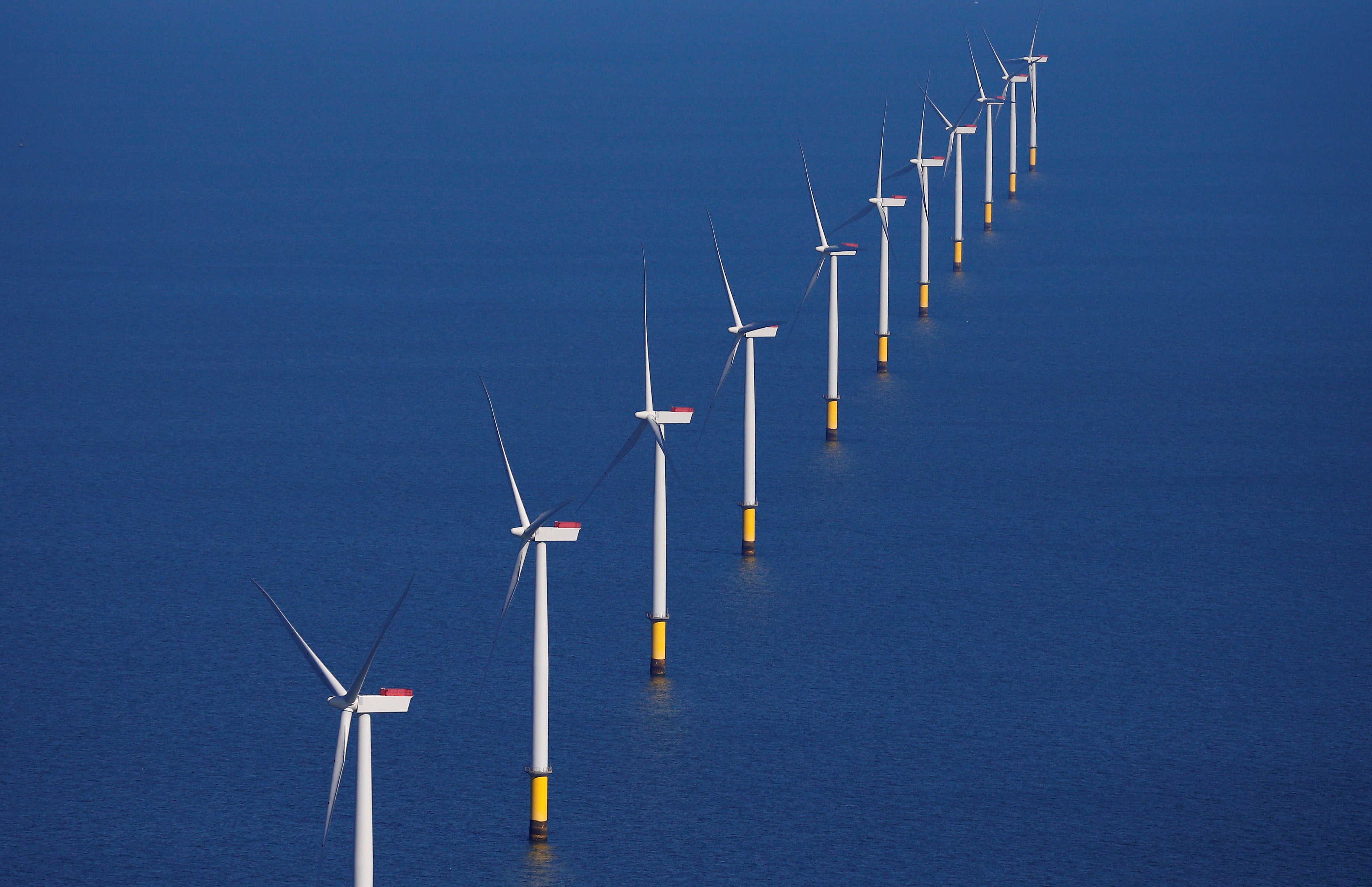Renewables overtake fossil fuels for first time in UK as Europe transitions to green energy
Historic milestone also reported in Spain, as Germany signals shift away from polluting electricity production, writes Tom Batchelor


The rapid rise of renewables continued in 2020 with wind, solar, bioenergy and hydropower overtaking fossil fuels to collectively become the UK’s largest source of electricity for the first time.
Analysis from think tanks Ember and Agora Energiewende found that those four cleaner energies accounted for a record 42 per cent of the country’s electricity generation last year, while fossil fuels – mostly gas – fell into second place with a 41 per cent share.
Renewables also became the largest source of electricity for the European Union in 2020, with Germany and Spain – the bloc’s two largest electricity-consuming countries – reporting the same tipping point.
Ember said the historic milestone showed “how momentum is building across Europe for the transition to clean electricity”.
In 2019, renewables generated 37 per cent of the UK’s electricity compared to 45 per cent for fossil fuels.
The study, entitled The European Power Sector in 2020, noted that for the first time, nearly a quarter (24 per cent) of the UK’s electricity was generated by wind turbines in 2020, doubling its share since 2015 and up from 20 per cent in 2019.
Meanwhile, coal generated just 2 per cent of the UK’s electricity last year, falling rapidly from 2015 when it delivered 23 per cent of the UK’s needs.
Ember said that with coal already near zero, rising wind and falling electricity demand due to Covid-19, fossil gas generation plunged to a five-year low. However, gas remains the UK’s single biggest power source, generating 37 per cent of UK electricity in 2020.
Solar and hydro, which generated 4 per cent and 2 per cent of the UK’s electricity respectively, were unchanged since last year.
Solar has barely grown since 2018, which Ember said reflected the “lack of a supportive policy environment for the technology”.
Charles Moore, Ember’s European programme lead, said: “With Boris Johnson’s 40-gigawatt 2030 offshore wind target, gas generation is set for further rapid declines over the 2020s.
“It is clear the UK has started its journey towards gas power phase-out in 2035 as recommended by the Climate Change Committee.”
However, earlier in January it emerged the government was to allow the UK’s first deep coal mine in decades in Cumbria, despite its policy of phasing out fossil fuels.
The government was urged to intervene after Cumbria county councillors gave the project the green light in March 2019. But Robert Jenrick, secretary of state for housing, communities and local government, opted not to use his powers to overrule the decision.
Commenting on the latest report, Rachel Kennerley, climate campaigner at Friends of the Earth, told The Independent: "Renewable energy sources beat fossil fuels in so many ways. They’re better for the planet, give us healthier air, can support more jobs, and in most cases are cheaper.
“So why doesn’t the UK just ditch dirty coal, oil and gas? The government recently gave the go ahead to a new coal mine in Cumbria, and agreed a billion dollars of finance for a gas project in Mozambique. To combat the climate crisis ministers must end support for all fossil fuels here and overseas, and support renewables instead.“
Rebecca Newsom, head of politics at Greenpeace UK, said: “These findings confirm that despite inconsistent support from the government, renewables have continued to boom, as both the lowest cost, and most climate-friendly option for new power generation.
“To genuinely tackle the climate emergency and secure thousands of new green jobs, the government must fully commit to rolling out renewables at an even greater speed and scale.
“That means the government must stop issuing new oil and gas licenses, it must roll out offshore wind at scale while protecting nature, and it must support fossil fuel workers to transition to the clean industries of the future.”
On the continent, renewables rose to generate 38 per cent of the EU’s electricity in 2020 (compared to 34.6 per cent in 2019), for the first time overtaking fossil-fired generation, which fell to 37 per cent.
But the transition from coal to clean energy is “still too slow” for reaching the bloc’s target of 55 per cent greenhouse gas reductions by 2030 and climate neutrality by 2050, a European scorecard produced by Ember said.
“While Covid-19 had an impact in all countries, its impact on the overall trend from fossil fuels to renewables was quite limited,” Ember’s analysis said.
“The rise in renewables was reassuringly robust despite the pandemic, and the fall in fossil-fired electricity could have been even more dramatic had it not been for such a bounce-back in electricity demand and the worst year on record for nuclear generation.”


Join our commenting forum
Join thought-provoking conversations, follow other Independent readers and see their replies
Comments